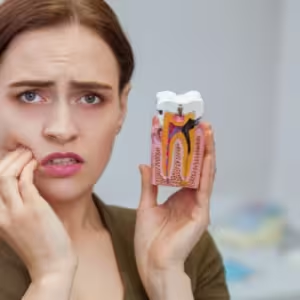
Accidents can happen at any moment, and when they involve your mouth, the consequences can be painful and alarming. As a leading dental practice in Ashburn, VA, Dr. Ninh and the team at Dental 32 want to equip you with the knowledge to recognize and respond to common dental injuries. Understanding these injuries can help you act quickly, potentially saving a tooth or alleviating severe pain. In this blog, we’ll explore the top five dental injuries, their causes, and how they can lead to dental emergencies.
1. Tooth Fractures
Causes
Tooth fractures are among the most common dental injuries. They can occur due to various reasons, such as sports accidents, falls, biting down on hard objects, or even grinding your teeth (bruxism). The severity of the fracture can vary, from minor chips to complete breaks that expose the pulp.
Emergency Implications
A fractured tooth can lead to immediate pain and sensitivity, especially if the fracture exposes the nerve. If left untreated, it can result in infections, abscesses, and even tooth loss. Seeking prompt care is essential to assess the damage and determine the best treatment, which may include dental bonding, crowns, or, in severe cases, root canal therapy.
What to Do
If you experience a tooth fracture:
- Rinse your mouth with warm water to keep the area clean.
- Apply a cold compress to reduce swelling.
- Avoid chewing on that side of your mouth until you see Dr. Ninh.
2. Knocked-Out Teeth (Avulsed Teeth)
Causes
Knocked-out teeth typically result from high-impact sports, falls, or accidents. Children are particularly prone to this injury during play, but adults can also experience it. A knocked-out tooth is considered a dental emergency that requires immediate attention.
Emergency Implications
If you act quickly, there’s a chance to save the tooth. The sooner you seek help, the better the chances of reattachment. Waiting too long can lead to complications such as bone loss or infection.
What to Do
If you or someone else has a knocked-out tooth:
- Handle the tooth by the crown (the part that is normally visible), not the root.
- Rinse it gently with water, but do not scrub or remove any tissue attached.
- If possible, place the tooth back in its socket. If this isn’t possible, keep it moist by placing it in a glass of milk or a saline solution.
- See Dr. Ninh immediately for further treatment.
3. Dental Luxation
Causes
Dental luxation occurs when a tooth is loosened or moved from its normal position without being completely knocked out. This can happen during contact sports, accidents, or even biting down on something hard.
Emergency Implications
A luxated tooth can be painful and may lead to complications if not addressed promptly. The tooth may become increasingly loose, and the surrounding tissue can become damaged. In severe cases, it can result in tooth loss or the need for root canal treatment if the pulp is compromised.
What to Do
If you experience dental luxation:
- Avoid moving the tooth further.
- Rinse your mouth with saltwater to reduce inflammation.
- Apply a cold compress to manage swelling.
- Contact Dental 32 for an emergency appointment to evaluate the injury.
4. Soft Tissue Injuries
Causes
Soft tissue injuries include cuts, abrasions, or lacerations to the gums, cheeks, tongue, or lips. They can result from accidents, sports injuries, or even dental procedures.
Emergency Implications
While soft tissue injuries may not always seem severe, they can lead to significant bleeding and, if infected, complications that require medical treatment. An untreated injury can also cause pain and difficulty in eating or speaking.
What to Do
If you suffer a soft tissue injury:
- Rinse your mouth gently with warm water.
- Apply pressure with a clean cloth or gauze to stop bleeding.
- If bleeding does not stop after 10 minutes, or if the injury is severe, seek emergency care at Dental 32.
5. Broken Dental Work
Causes
Broken crowns, fillings, or other dental restorations can occur due to biting down on hard foods, wear and tear, or trauma to the mouth. These issues can lead to further dental complications if not addressed promptly.
Emergency Implications
When dental work breaks, it can expose the underlying tooth structure, leading to pain, sensitivity, and increased risk of decay or infection. Depending on the situation, this may require immediate care to replace the restoration or address any underlying issues.
What to Do
If you break a filling or crown:
- Keep any pieces of the restoration if possible.
- Rinse your mouth with warm water to clean the area.
- Use dental wax or temporary filling material (available at pharmacies) to cover the area if necessary.
- Contact Dr. Ninh at Dental 32 as soon as possible for an evaluation and treatment options.
Conclusion
Dental emergencies can be frightening, but knowing how to handle them can make a significant difference in the outcome. At Dental 32 in Ashburn, VA, Dr. Ninh and our team are committed to providing prompt, compassionate care for all dental injuries. Remember to act quickly, seek professional help, and follow the recommended steps to ensure your dental health remains a priority.
If you or a loved one experiences a dental emergency, don’t hesitate to contact us. We’re here to help you get back to smiling comfortably!
FAQs
Non-covered benefits may not be deemed medically necessary by insurance providers but can still be essential for maintaining dental health.
If a procedure isn’t covered by insurance, it’s essential to discuss alternative payment options with your dentist and budget for the expense accordingly.
Regular dental check-ups are critical for preventive care, regardless of insurance coverage. Skipping them can lead to more significant dental issues in the future
Budgeting for dental expenses ensures that you can cover the costs of non-covered benefits and access necessary treatments when needed.
